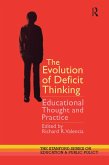Students come to universities with identities, knowledge, and lived experiences that contribute to their success. They offer unique viewpoints and enrich the spaces they inhabit through their differences. However, educators often default to deficit thinking, an unintentionally harmful mindset that aims to support students by attempting to "fix" their perceived shortcomings. Dismantling Deficit Thinking in Academic Libraries weaves theory, practice, and reflection to introduce deficit thinking and provide alternative strategies and educational principles that have the power to transform our work with students. In this book, readers will explore the history of deficit thinking in higher education and how it has negatively impacted student learning, particularly for marginalized students. A discussion of pedagogical models that recognize students' prior knowledge and experiences, such as funds of knowledge, culturally relevant pedagogy, and open pedagogy, culminates in a series of principles for anti-deficit teaching. This is followed by an exploration of practical application of these principles in various academic library environments. Additionally, between sections or weaved within them, we have included reflections from critical information literacy educators who are actively engaged in anti-deficit education. Complementing each section of the book are reflective exercises that encourage readers to consider how their own experiences, privileges, and perspectives influence their positionality. This reflective work will unearth internalized deficit thinking and inspire ideas for applying alternative pedagogical models. Dismantling Deficit Thinking in Academic Libraries serves as a guide for librarians interested in the challenging but crucial work of reconceptualizing the academic library to honor the knowledge, experiences, and strengths students bring to the university community. Bios Chelsea Heinbach is a teaching and learning librarian at the University of Nevada, Las Vegas where she works to create meaningful learning experiences for undergraduate students. Chelsea is a co-founder and editor of The Librarian Parlor (#libparlor), a community for librarians interested in conducting research. Her research interests include dismantling deficit approaches to students, critical pedagogy, and the intersection between civic engagement and information literacy education. Rosan Mitola is the interim head of Educational Initiatives for the University of Nevada, Las Vegas, where she leads the library instruction program and provides leadership for the Libraries' educational role on campus. Rosan also designs co-curricular learning experiences for students and oversees the Mason Undergraduate Peer Research Coach program. Her research interests include peer learning, student employment as a high-impact practice, and dismantling deficit thinking in academic libraries. Erin Rinto is the learning and research librarian at the University of Cincinnati. She received an MLS and an MA in History from Indiana University Bloomington and a BA in History from Wittenberg University. Her primary research interests include information literacy instruction and assessment in first year writing courses, peer-assisted learning, and the integration of high impact practices into library services.
Hinweis: Dieser Artikel kann nur an eine deutsche Lieferadresse ausgeliefert werden.
Hinweis: Dieser Artikel kann nur an eine deutsche Lieferadresse ausgeliefert werden.








